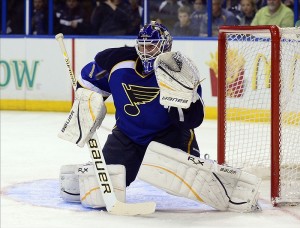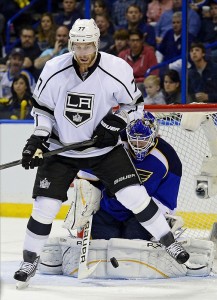
In just two seasons with the St. Louis Blues, Brian Elliott has worn two different masks. No, I am not talking about the masks that protect his face.
Elliott was drafted by the Ottawa Senators in the ninth round, 291st overall, in the 2003 NHL Entry Draft. Hockey’s Future explained that Elliott’s low selection was because of spotty rebound control. He was even the second-string goaltender for the University of Wisconsin for his first two years, sitting behind Bernd Bruckler (currently a backup in the Austrian League).
Elliott soon became the Badgers’ starter, then turned pro to play for the Binghamton Senators of the AHL. He played in his first NHL game on October 10, 2007 with the Senators.
Along with Ottawa, Elliott also played with the Colorado Avalanche; two teams that were not exactly known for their stellar defensive play. In three seasons, Elliott posted a sub-par 2.90 GAA with a .901 save percentage in 142 games played. Elliott became a free-agent in 2011 after the Avalanche opted to not renew his contract.
With goaltending talent swarming the NHL, Elliott may not have expected a job with an NHL team. He signed a two-way, $600,000 contract with the Blues, fully expecting a battle with the St. Louis-born Ben Bishop for the backup job to starter Jaroslav Halak.
From there, everyone knows the Brian Elliott saga. He stepped in for Halak early in the 2011-12 season and played lights-out hockey, posting a 15-5-0 record with a 1.62 GAA and a .912 save percentage to start the year and earn his first trip to the NHL All-Star Game. He didn’t stop there as he led the NHL with nine shutouts to end 2011-12, including a three-game shutout streak in late March to help solidify the Blues as the Central Division Champions.
His play earned him a two-year contract extension, a pay raise and the uncertainty of job status was eliminated at the trade deadline when the Blues traded Bishop to the Ottawa Senators.
Struggles turned up for Elliott in the playoffs after he stepped in for Halak, who was injured in Game 2 of the Blues’ Quarterfinal Series with the San Jose Sharks. Elliott backstopped the Blues to a five-game victory over the Sharks, but faltered against the Los Angeles Kings. He posted a less-than-thrilling 3.31 GAA with a poor .854 save percentage in the Kings’ four-game sweep of the St. Louis team.

Elliott stumbled out of the gate to open the shortened 2012-13 season as well. After starting the year 3-1-0, Elliott posted an abysmal 0-6-1 record in his next seven games, including five straight losses in what Head Coach Ken Hitchcock coined “the home stand from hell.”
Elliott’s poor play, accompanied by yet another injury to Halak, forced the Blues to give top goaltending prospect Jake Allen his first crack at the NHL and he did not disappoint. The 23-year old posted an 8-1-0 record in his first nine games started, including his first career shutout in a 3-0 victory over the Phoenix Coyotes on March 14.
With Halak returning from injury and Allen on a tear, Elliott was sent to Peoria for a reconditioning stint on March 28, just before the NHL Trade Deadline. Speculation surrounded Elliott, as many suggested that he could be traded for spare parts (including those at TheHockeyWriters.com).
But Elliott found that magic again when he returned to the St. Louis lineup. To close out the NHL season, Elliott posted an 11-2-0 record with a 1.82 GAA and .948 save percentage in April, earning the NHL’s second star honors of the month. He has not let up in the playoffs, either. The native of Newmarket, Ontario has been a vital part to the Blues’ success in the post-season, allowing just three goals on 79 Kings shots in the three games played. His miniscule 0.93 GAA and .962 save percentage are both second-best in the league to only Braden Holtby of the Washington Capitals. Elliott’s play has even kept Halak on the bench, despite returning from injury three games ago.
As much as Jonathan Quick has been an enigma to the Blues’ offense, Elliott has been a needle in the side to the Kings’ offense. With dazzling saves followed by quick rebound control, the Kings have run into a brick wall when trying to muster offense.
“When things went bad, he never quit,” Blues Goaltending coach Corey Hirsch told ESPN.com after Game 1. “He kept going on the ice, he kept asking to go out early, he kept just sticking with it. It’s a cliché, but he worked really hard. He’s earned this, he earned it the hard way.”
In Game 3, Elliott’s glove save on Dwight King on a breakaway was critical considering the Blues were down just 1-0 with seven minutes remaining.
With Elliott between the pipes, the Blues have a chance to win every night. Not bad for someone picked second-to-last in his draft year.